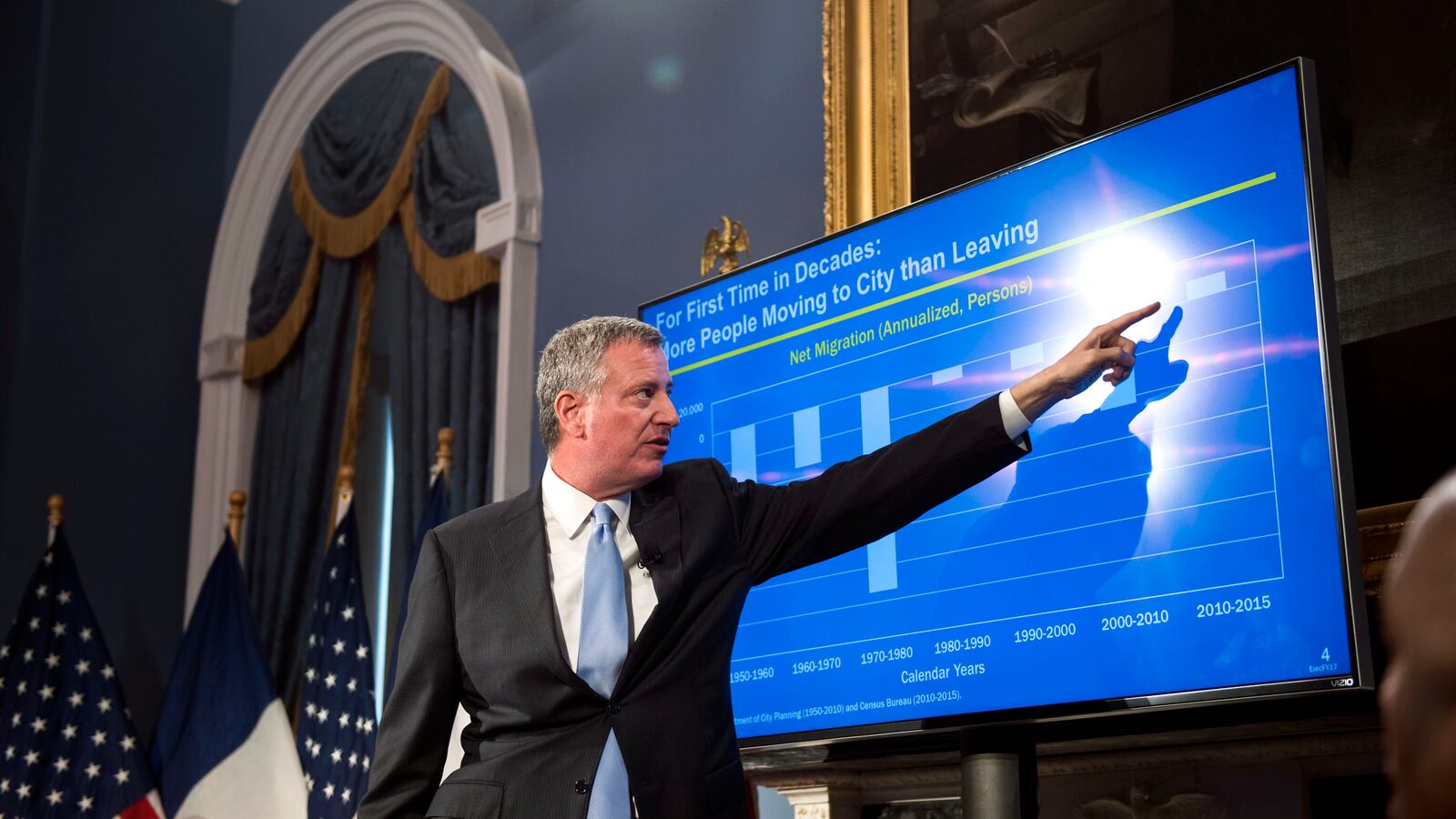New York City will spend nearly $30 million to increase health services and offer other help for the city’s growing number of homeless students, Mayor Bill de Blasio announced Tuesday.
The funding comes from the state and will go toward new school-based health centers and programs inside homeless shelters that help children with literacy and attendance. The initiatives, included in de Blasio’s updated spending plan for the coming fiscal year, are the mayor’s latest attempt to grapple with the city’s rising homeless population, which includes more than 86,000 public school students in temporary housing and has grown 25 percent since 2010.
Overall, the mayor’s office estimates that $23 billion will go to the city’s schools next school year — roughly $1 billion more than this year. The increase relies partly on a boost in state funding, which lawmakers secured after Gov. Andrew Cuomo initially proposed a smaller amount for the city.
The additional commitments to homeless students reflect a growing need. More than 23,000 city students currently live in homeless shelters, while tens of thousands more live “doubled up” in apartments with multiple families, and others live on the street. Homeless children are more likely than their peers to face hunger, illness, or emotional issues, and to struggle in school — a reality reflected in their lower average test scores and higher suspension and absence rates.
“If we can support their well being, they can feel better, attend school, focus on their school work,” said Elizabeth Rose, the education department’s head of operations, “and that will support their academic outcomes.”
[Four sobering facts about the city’s 86,000 homeless students]
The mayor’s new initiative will use $19.5 million to build health clinics at up to 13 campuses that house large elementary schools where many students live in shelters. That effort stems from data showing that homeless students who attend city schools with health clinics miss less class time, officials said.
Another $10.3 million will fund an array of programs in shelters, including reading help for students and parents, workshops to assist with the middle and high-school application process, and attendance workers in shelters where students most often miss school. In addition, schools will receive extra funding for doctor’s visits, and social workers will be placed in schools that have large numbers of homeless students but no full-time social workers or counselors.
Those efforts follow the city’s recent addition of nearly 190 new yellow bus routes to help transport students from homeless shelters to schools. On average, students who live in homeless shelters miss nearly one out of every five school days — a rate twice as high as their peers in permanent housing.
The mayor’s budget, which follows a preliminary spending plan in January, also adds new funding for Advanced Placement courses and school budgets. But it does not fulfill advocates’ demands for the city to provide free lunch to all students or to restore summer programs for middle schoolers.
“This budget states our priorities,” de Blasio said during a press briefing. He added: “We are doubling down on building that pathway to college.”
The mayor’s budget also adds $9 million to help meet the state’s physical-education requirements. Nearly a third of city schools lack a full-time physical education teacher, according to a 2015 report by the city comptroller.
It also retains the major education expenditures that de Blasio unveiled in his preliminary budget in January. Those include:
- $161 million to boost the budgets of 657 schools that currently receive less than they are due under the city’s Fair Student Funding formula, which is based on the number of high-needs students that schools serve.
- $76 million for a slate of programs that de Blasio announced in September, which he called his “Equity and Excellence” education agenda. Those include new reading specialists for elementary schools, algebra classes in middle schools, and Advanced Placement classes and college counseling in high schools.
The mayor rejected calls for the city to provide free lunch to all students, since officials fear that could jeopardize the city’s federal funding. He also declined to restore funding for summer programs that advocates say are concentrated in low-income neighborhoods, or to increase the salaries of pre-kindergarten teachers who work at community centers.
“We are deeply disappointed that the Executive Budget does not support essential services for our city’s children,” the advocacy group Campaign for Children said in a statement, “including cuts to summer programs for 31,000 middle school students and a lack of fair pay for early childhood educators in community-based programs.”


